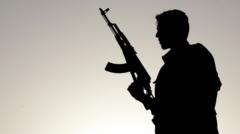In a historic gesture towards peace, the Kurdish PKK disarmed in a public ceremony, marking a significant milestone in efforts to resolve the decades-long conflict with Turkey. This disarmament comes amid growing political reconciliation efforts led by Turkish authorities and is viewed as a potential turning point for Kurdish rights and regional stability.
Kurdish PKK Marks Historic Disarmament Ceremony in Efforts to End Turkey Conflict

Kurdish PKK Marks Historic Disarmament Ceremony in Efforts to End Turkey Conflict
Symbolic act signals a potential shift towards peace as PKK fighters voluntarily surrender arms amid ongoing tensions in Turkey.
In a historic event aimed at achieving a peaceful resolution to the long-standing conflict in Turkey, the outlawed Kurdish Workers' Party (PKK) held a disarmament ceremony, signaling a possible end to four decades of armed struggle. Around 30 fighters, both men and women, participated in the symbolic burning of their weapons in a cauldron at Jasana Cave, located 50km north-west of Suleymaniyah in Iraqi Kurdistan, a well-known tourist spot. This action marks the official beginning of a disarmament process set to unfold over the summer.
The Turkish government has welcomed this ceremony, emphasizing that it represents a "critical threshold" in the country's aim for a "terror-free Turkey." The conflict that has persisted since 1984 has claimed approximately 40,000 lives, with the PKK recognized as a terrorist organization by Turkey, the US, EU, and UK. The implications of the PKK's disarmament may reverberate beyond Turkey's borders, affecting regions in Iraq, Syria, and Iran.
The disarmament initiative was spurred by remarks from the PKK's long-imprisoned leader, Abdullah Ocalan, who called for a transition from armed conflict to democratic politics. Ocalan, has been held in isolation since his capture in 1999, and his recent appeal to the PKK influenced the group's decision to disband, highlighting the changing political dynamics in the Turkish landscape.
Tensions have existed for decades between the Turkish state and its Kurdish population, illustrating a complex history of demands for autonomy and rights. Existing attempts to broker peace have often faltered; however, with the new disarmament process underway, optimism surrounds its potential to finally resolve the Kurdish issue through democratic means.
Those present at the ceremony included members of Turkey's pro-Kurdish opposition party, demonstrating a newfound political engagement between the Turkish authorities and the Kurdish community. The ongoing negotiations also involve the Iraqi and regional Kurdish governments, making it a significant multi-party effort towards a durable peace process.
As the Turkish parliament prepares to establish a commission to discuss further steps, the political landscape could witness substantial changes. Speculation surrounds the future of Abdullah Ocalan and the evolving relationship between the PKK and the Turkish state, especially in the context of President Erdogan’s aspirations to amend the constitution, potentially affecting his political future.
As the summer progresses, the ramifications of this disarmament ceremony will unfold, while the people of Turkey and the region remain hopeful for a lasting resolution to a conflict that has deeply influenced their lives for generations.


















